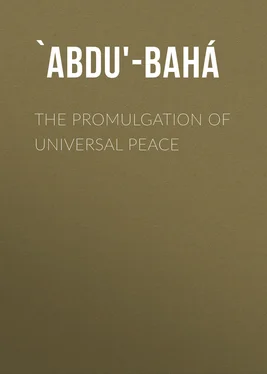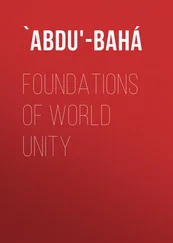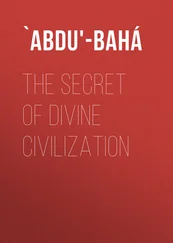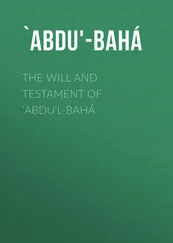`Abdu'-Bahá - The Promulgation of Universal Peace
Здесь есть возможность читать онлайн «`Abdu'-Bahá - The Promulgation of Universal Peace» — ознакомительный отрывок электронной книги совершенно бесплатно, а после прочтения отрывка купить полную версию. В некоторых случаях можно слушать аудио, скачать через торрент в формате fb2 и присутствует краткое содержание. Издательство: Иностранный паблик, Жанр: foreign_prose, foreign_religion, Философия, Ужасы и Мистика, foreign_psychology, на английском языке. Описание произведения, (предисловие) а так же отзывы посетителей доступны на портале библиотеки ЛибКат.
- Название:The Promulgation of Universal Peace
- Автор:
- Издательство:Иностранный паблик
- Жанр:
- Год:неизвестен
- ISBN:нет данных
- Рейтинг книги:4 / 5. Голосов: 1
-
Избранное:Добавить в избранное
- Отзывы:
-
Ваша оценка:
- 80
- 1
- 2
- 3
- 4
- 5
The Promulgation of Universal Peace: краткое содержание, описание и аннотация
Предлагаем к чтению аннотацию, описание, краткое содержание или предисловие (зависит от того, что написал сам автор книги «The Promulgation of Universal Peace»). Если вы не нашли необходимую информацию о книге — напишите в комментариях, мы постараемся отыскать её.
The Promulgation of Universal Peace — читать онлайн ознакомительный отрывок
Ниже представлен текст книги, разбитый по страницам. Система сохранения места последней прочитанной страницы, позволяет с удобством читать онлайн бесплатно книгу «The Promulgation of Universal Peace», без необходимости каждый раз заново искать на чём Вы остановились. Поставьте закладку, и сможете в любой момент перейти на страницу, на которой закончили чтение.
Интервал:
Закладка:
Reality or truth is one, yet there are many religious beliefs, denominations, creeds and differing opinions in the world today. Why should these differences exist? Because they do not investigate and examine the fundamental unity, which is one and unchangeable. If they seek reality itself, they will agree and be united; for reality is indivisible and not multiple. It is evident, therefore, that there is nothing of greater importance to mankind than the investigation of truth.
The second teaching of Bahá’u’lláh is the oneness of the world of humanity. Every human creature is the servant of God. All have been created and reared by the power and favor of God; all have been blessed with the bounties of the same Sun of divine truth; all have quaffed from the fountain of the infinite mercy of God; and all in His estimation and love are equal as servants. He is beneficent and kind to all. Therefore, no one should glorify himself over another; no one should manifest pride or superiority toward another; no one should look upon another with scorn and contempt; and no one should deprive or oppress a fellow creature. All must be considered as submerged in the ocean of God’s mercy. We must associate with all humanity in gentleness and kindliness. We must love all with love of the heart. Some are ignorant; they must be trained and educated. One is sick; he must be healed. Another is as a child; we must assist him to attain maturity. We must not detest him who is ailing, neither shun him, scorn nor curse him, but care for him with the utmost kindness and tenderness. An infant must not be treated with disdain simply because it is an infant. Our responsibility is to train, educate and develop it in order that it may advance toward maturity.
The third teaching or principle of Bahá’u’lláh is that religion and science are in complete agreement. Every religion which is not in accordance with established science is superstition. Religion must be reasonable. If it does not square with reason, it is superstition and without foundation. It is like a mirage, which deceives man by leading him to think it is a body of water. God has endowed man with reason that he may perceive what is true. If we insist that such and such a subject is not to be reasoned out and tested according to the established logical modes of the intellect, what is the use of the reason which God has given man? The eye is the organ of sense by which we view the world of outer phenomena; hearing is the faculty for distinguishing sounds; taste senses the properties of objects, such as bitter, sweet; smell detects and differentiates odors; touch reveals attributes of matter and perfects our communication with the outer world; yet after all, the circle and range of perception by the five senses is exceedingly limited. But the intellectual faculty of man is unlimited in its sphere of action. The eye views details perhaps a mile, but the intellect can perceive the far East and West. The ear may hear tone modulations at one thousand feet, but the mind of man can detect the harmonies of the heavenly spheres as they swing in their courses. Mind makes geological discoveries in subterranean depths and determines the processes of creation in the earth’s lowest strata. The sciences and arts, all inventions, crafts, trades and their products have come forth from the intellect of man. It is evident that within the human organism the intellect occupies the supreme station. Therefore, if religious belief, principle or creed is not in accordance with the intellect and the power of reason, it is surely superstition.
At another time I shall speak further of the principles revealed in the teachings of Bahá’u’lláh.
TALKS ‘ABDU’L-BAHÁ DELIVERED IN CHICAGO, WILMETTE, AND EVANSTON
30 April 1912
Talk at Public Meeting Concluding Convention of Bahá’í Temple Unity
Drill Hall, Masonic Temple, Chicago, Illinois
Among the institutes of the Holy Books is that of the foundation of places of worship. That is to say, an edifice or temple is to be built in order that humanity might find a place of meeting, and this is to be conducive to unity and fellowship among them. The real temple is the very Word of God; for to it all humanity must turn, and it is the center of unity for all mankind. It is the collective center, the cause of accord and communion of hearts, the sign of the solidarity of the human race, the source of eternal life. Temples are the symbols of the divine uniting force so that when the people gather there in the House of God they may recall the fact that the law has been revealed for them and that the law is to unite them. They will realize that just as this temple was founded for the unification of mankind, the law preceding and creating it came forth in the manifest Word. Jesus Christ, addressing Peter, said, “Thou art Peter, and upon this rock I will build my church.” This utterance was indicative of the faith of Peter, signifying: This faith of thine, O Peter, is the very cause and message of unity to the nations; it shall be the bond of union between the hearts of men and the foundation of the oneness of the world of humanity. In brief, the original purpose of temples and houses of worship is simply that of unity—places of meeting where various peoples, different races and souls of every capacity may come together in order that love and agreement should be manifest between them. That is why Bahá’u’lláh has commanded that a place of worship be built for all the religionists of the world; that all religions, races and sects may come together within its universal shelter; that the proclamation of the oneness of mankind shall go forth from its open courts of holiness—the announcement that humanity is the servant of God and that all are submerged in the ocean of His mercy. It is the Ma shriqu’l-A dhkár. The world of existence may be likened to this temple and place of worship. For just as the external world is a place where the people of all races and colors, varying faiths, denominations and conditions come together—just as they are submerged in the same sea of divine favors—so, likewise, all may meet under the dome of the Ma shriqu’l-A dhkár and adore the one God in the same spirit of truth; for the ages of darkness have passed away, and the century of light has come. Ignorant prejudices are being dispelled, and the light of unity is shining. The differences existing between nations and peoples will soon be annulled, and the fundamentals of the divine religions, which are no other than the oneness and solidarity of the human race, are being established. For thousands of years the human race has been at war. It is enough. Now let mankind, for a time at least, consort in amity and peace. Enmity and hatred have ruled. Let the world, for a period, exercise love. For thousands of years the nations have denied each other, considering each other as infidel and inferior. It is sufficient. We must now realize that we are the servants of one God, that we turn to one beneficent Father, live under one divine law, seek one reality and have one desire. Thus may we live in the utmost friendship and love, and in return the favors and bounties of God shall surround us; the world of humanity will be reformed; mankind, enjoy a new life; eternal light will illumine, and heavenly moralities become manifest.
Then divine policy shall govern the world, for the divine policy is the oneness of humanity. God is just and kind to all. He considers all as His servants. He excludes none, and His judgments are correct and true. No matter how complete human policy and foresight may appear, they are imperfect. If we do not seek the counsel of God or if we refuse to follow His dictates, it is presumptive evidence that we are knowing and wise, whereas God is ignorant; that we are sagacious and God is not. God forbid! We seek shelter in His mercy for this suggestion! No matter how far the human intelligence may advance, it is still but a drop, while divine omniscience is the ocean. Shall we say that a drop is imbued or endowed with qualities of which the ocean is devoid? Shall we believe that the policy and plan of this atom of a human soul are superior to the wisdom of the Omniscient? There is no greater ignorance than this. Briefly, some are mere children; with the utmost love we must educate them to make them wise. Others are sick and ailing; we must tenderly treat them until they recover. Some have unworthy morals; we must train them toward the standard of true morality. Other than this we are all the servants of one God and under the providence and protection of one Father.
Читать дальшеИнтервал:
Закладка:
Похожие книги на «The Promulgation of Universal Peace»
Представляем Вашему вниманию похожие книги на «The Promulgation of Universal Peace» списком для выбора. Мы отобрали схожую по названию и смыслу литературу в надежде предоставить читателям больше вариантов отыскать новые, интересные, ещё непрочитанные произведения.
Обсуждение, отзывы о книге «The Promulgation of Universal Peace» и просто собственные мнения читателей. Оставьте ваши комментарии, напишите, что Вы думаете о произведении, его смысле или главных героях. Укажите что конкретно понравилось, а что нет, и почему Вы так считаете.












